- Home
- Gregory Maguire
Wicked: The Life and Times of the Wicked Witch of the West Page 29
Wicked: The Life and Times of the Wicked Witch of the West Read online
Page 29
Kiamo Ko was just a week away.
The Grasstrail Train turned eastward, into the steel gray passes of the steep Great Kells. Winter was almost here, and the last travelers were grateful that the snows had held off. Oatsie intended to stop the winter in an Arjiki camp some twenty miles on. In the spring she would head back to the Emerald City, making the northern route through Ugabu, and the Pertha Hills of Gillikin. Elphie thought of sending a note to Glinda, if after all these years she was still there—but, being unable to decide yes, she decided no.
“Tomorrow,” said Oatsie, “we’ll see Kiamo Ko. The mountain stronghold of the ruling clan of the Arjikis. Are you ready, Sister Elphie?”
She was teasing, and Elphie didn’t like it. “I am no longer a sister, I am a witch,” she said, and tried to think poisonous thoughts at Oatsie. But Oatsie was a stronger person than the cook, apparently, for she just laughed and went on her way.
The Grasstrail Train stopped on the side of a small tarn. The others said its water was refreshing, though icy cold; Elphie didn’t know or care about that. But in the middle was an island—a tiny thing, the size of a mattress, sprouting one leafless tree like an umbrella that has lost its fabric.
Before Elphaba could quite make it out—the evening light came early at this time of year, and even earlier in the mountains—Killyjoy had plunged feverishly into the water, and splashed and swum his way to the island, intent on some small movement or interesting scent he had picked up. He ferreted in the sedge, and then clamped his teeth—the most wolflike of his features—gently around the skull of a small beast in the grass.
Elphie couldn’t see but it looked like a baby.
Oatsie screamed, Liir quivered like a blob of jelly, Killyjoy released his grip, but only to get a further hold; he was drooling over the scalp of the thing he had caught.
There was no way to go through the water—that would be death—
But her feet went out anyway—
They hit the water hard, the water hit hard back—
The water turned to ice as she ran—foot by foot of ice under foot by foot of hurry. A silvering plate formed instantly, cantilevering forward, making a cold safe bridge to the island—
Where Killyjoy could be scolded, and the baby saved, though she hadn’t dared hope she could be in time. She pried Killyjoy’s jaws apart, and scooped up the thing. It shivered in terror and the cold. Its bright black eyes were alert and watching, ready to upbraid or condemn or love, same as any capable adult thing.
The others were surprised to see it, as surprised as they’d been to see the ice form, perhaps by some magic spell left on the tarn from some passing wizard or witch. It was a small monkey—of the variety called the snow monkey. A baby abandoned by its mother and its tribe, or maybe separated by accident?
It didn’t think much of Killyjoy but it liked the warmth of the wagon.
They pitched their camp halfway up the perilous slope to Kiamo Ko. The castle rose in steep black angles out of black rock. Elphie could see it perched above them like an eagle with folded wings; its conical-roofed towers, its battlements and bartizans, its portcullis and arrow-slit windows—they all belied its original intention as the head of a waterworks. Below it wound a powerful tributary of the Vinkus River on which the Ozma Regent once had meant to build a dam and channel water into the center of Oz—back when the droughts were their most threatening. Fiyero’s father had taken this stronghold by siege and storm and made it the seat of the Arjiki princes, before dying and leaving the clan leadership to his only son, if Elphaba remembered rightly.
The small luggage was packed, the bees hummed (their melodies ever more amusing as she listened, week by week), Killyjoy was still sulking over being denied the kill, the crows sensed that a change was coming and wouldn’t eat dinner. The monkey, who was called Chistery because of the sound he made, chittered and chattered now that he was warm and safe.
Around the campfire good-byes were spoken, a few toasts, even a few regrets. The sky was blacker than it had been before: perhaps it was the contrast of the whiteness of snowy peaks all around. Liir showed up with a parcel of clothing and some sort of musical instrument, and said good-byes too.
“Oh, so you’re stopping here, are you?” said Elphie.
“Yes,” he said, “with you.”
“With the crows, with the monkey, with the bees, with the dog, and with the Witch?” she said. “With me?”
“Where else can I go?” he asked.
“I’m sure I don’t know,” she answered.
“I can take care of the dog,” he said calmly. “I can collect the honey for you.”
“It makes no difference to me,” she said.
“All right,” he said, and so Liir prepared to enter his father’s house.
The Jasper
Gates of
Kiamo Ko
I
Sarima,” said her youngest sister, “wake up. Naptime’s over. We have a houseguest at supper, and I need to know if we have to kill a hen. There are so few left, and what we give the traveler we miss all winter in eggs . . . What do you think?”
The Dowager Princess of the Arjikis groaned. “Details, details,” she said, “can’t I train you to figure out anything for yourself?”
“Very well,” snapped the sister, “I shall decide, and then you can go without your morning egg when we’re one short.”
“Oh Six, don’t mind me,” said Sarima, “it’s just that I’m scarcely awake. Who is it? Some patriarch with bad breath, who plans to bore us with tales of the hunting he did fifty years ago? Why do we allow it?”
“It’s a woman—more or less,” said Six.
“Now that’s uncalled for,” said Sarima, sitting up. “We are none of us the blushing nymphs we once were, Six.” From across the room she saw herself reflected in the wardrobe glass: pale as milk pudding, her still pretty face nestled in the puddles of fat that fell according to the laws of gravity. “Just because you’re the youngest, Six, and can still locate your waist, there’s no need to be unkind.”
Six pouted. “Well, it’s just a woman, then: so chicken or no? Tell me now so Four can hack off its head and get to plucking, or we won’t eat before midnight.”
“We’ll have fruit and cheese and bread and fish. Is there fish in the fishwell, I suppose?” Yes, there was. Six turned to go, but remembered to say, “I brought you a glass of sweet tea, it’s there on your vanity.”
“Bless you. Now tell me, without sarcasm if you please, what’s our guest like, really?”
“Green as sin, thin and crooked, older than any of us. Dressed in black like an old maunt—but not all that old. I’d guess about, oh, thirty, thirty-two? She won’t give her name.”
“Green? How divine,” said Sarima.
“Divine isn’t the word that comes to mind,” said Six.
“You don’t mean green with jealousy—you mean actually green?”
“Maybe it’s from jealousy, I could not say, but she is surely green. Genuine grass green.”
“Oh la. Well, I’ll wear white tonight so as not to clash. Is she alone?”
“She came in with the caravan we saw down in the valley yesterday. She stopped here with a little company of beasts—a wolfdog, a hive of bees, a youth, some crows, and a baby monkey.”
“What’ll she do with all of them in the mountains in winter?”
“Ask her yourself.” Six wrinkled her nose. “She made me shudder.”
“Half-set gelatin makes you shudder. When’s dinner tonight?”
“Seven chimes and a half. She turns my stomach.”
Six left, having run out of expressions of disgust, and Sarima had her tea in bed until her bladder complained. Six had banked up the fire and drawn the curtains, but Sarima pulled them back to look down into the courtyard. Kiamo Ko boasted corner turrets and towers, built on massive circular salients thrusting upward from the stone of the mountain itself. After the Arjiki clan had wrested the building from the waterworks commission
, they had added toothy crenellations for defense. Despite the reworkings, the plan of the house was still simple. It was built in the general shape of a U, a central hall with two long narrow wings thrusting forward around a steeply pitched yard. When it rained, the water churned over the cobbles, and slipped out under the carved gates of iron oak and jasper panels, past the sickly cluster of village houses nestled up against the castle’s outside walls. At this hour the courtyard was charcoal gray. Cold and filthy with scraps of hay and bits of leaf flying in the wind. There was a light in the old cobbler’s shed, and smoke spinning from the chimney that badly wanted repointing—like everything else in this decaying manse. Sarima was glad the guest hadn’t been shown into the house proper. As Dowager Princess of the Arjikis, she enjoyed the privilege of welcoming a traveler into the private chambers of Kiamo Ko.
After bathing, she dressed in a white shift with white piping, and put on the beautiful torque that had arrived, like a message from the Other Land, from her dear departed husband several months after the Incident. Out of habit Sarima shed a few tears admiring herself within the flat embrace of its jeweled, segmented collar. If it was too dressy for this itinerant, Sarima could always drape a napkin over it. But she would still know it was there. Even before her tears had dried she was humming, looking forward to the novelty of a guest.
She peeped in on the children before going down. They were jumpy; strangers always did that to them. Irji and Manek, twelve and eleven, were almost old enough to want to bust out of this nest of venomous doves. Irji was soft and cried a lot, but Manek was a little bantam, always had been. If she let them go off to the Grasslands with the clan, in the summer migration, they both might have their throats slit—there were too many clansmen to claim leadership for themselves or their sons. So Sarima had kept her boys near.
Her daughter, Nor, long-legged and thumb-sucking at nine years old, still needed a lap to crawl into before going to sleep. Dressed for the meal, Sarima was inclined to forbid it, but relented. Nor had a delicate lisp and she said wunning in the wain for running in the rain. She befriended stones and candles and blades of grass that grew against all logic in the cracks of the coping stones around the windows. She sighed and rubbed her face against the torque and said, “There’s a boy too, Mama. We played with him in the mill yard.”
“What’s he like? Is he green too?”
“Nah. He’s all right. He’s a big baby—fat and strong, and Manek was throwing stones at him to see how far they would bounce off him. He let him do it. Maybe if you’re so fat it doesn’t hurt?”
“I doubt it. What’s his name?”
“Liir. Isn’t that a queer name?”
“It sounds foreign. And his mother?”
“I don’t know her name and I don’t think she’s his mother. He wouldn’t say when we asked. Irji said he must be a bastard. Liir said he didn’t care. He’s nice.” She moved her right thumb to her mouth, and with her left hand felt the cloth of Sarima’s gown just below the torque, until she found a nipple, and she ran her thumb over it lovingly as if it were a small pet. “Manek made him pull down his trousers so we could make sure his thing wasn’t green.”
Sarima disapproved—on the grounds of hospitality if nothing else—but was compelled to ask, “And what did you see?”
“Oh well you know.” Nor turned her head into her mother’s neck, and then sneezed from the powder with which Sarima kept her chins from chafing. “Stupid-looking boy’s thing. Smaller than Manek and Irji. But not green. I was so bored I didn’t look much.”
“Neither would I. That was very rude.”
“I didn’t make him do it. Manek did!”
“Well, no more of that. Now let’s have a story before sleeping. I’ve got to go down soon, so a short one. What do you want to hear, my little one?”
“I want to hear the story of the Witch and the fox babies.”
With less drama than usual Sarima rattled through the tale of how the three fox babies were kidnapped and caged and fed to fatness, in preparation for a cheese-and-foxling casserole, and how the Witch went to get fire from the sun to cook them. But when the Witch came back to her cave, exhausted and in possession of father flame, the foxlings outwitted her by singing a lullaby to make her sleep. When the Witch’s arm fell, the flame from the sun burned the door off the cage, and out the foxlings ran. Then they howled down old mother moon to come and stand as an unmovable door in the entrance of the cave. Sarima ended with the traditional back-and-forth. “And there the wicked old Witch stayed, for a good long time.”
“Did she ever come out?” asked Nor, doing her line from an almost hypnagogic state.
“Not yet,” said Sarima, kissing and biting her daughter on the wrist, which made them both giggle, and then lights out.
The stairs from Sarima’s private apartment ran without railings down into the castle keep, hugging first one wall and then, after the corner, another. She descended the first flight full of grace and self-possession, her white skirts billowing, her torque a yoke of soft colors and precious metals, her face a careful composition of welcome.
At the landing she saw the traveler, sitting on a bench in an alcove, looking up at her.
She made it down the second flight to the flagstoned level, aware of the cynicism that seethed beneath her loyal remembrance of Fiyero, aware of her overbite; of her lost prettiness; of her weight; of the silliness of being the doyenne over nothing but irritating children and backbiting younger sisters; of the thin pretense of authority that scarcely masked her fear of the present, the future, and even the past.
“How do you do,” she managed.
“You are Sarima,” said the woman, standing, her stalactite of chin thrust forward like a rotted swede.
“Likely to be!” she said, glad of the torque; it seemed like a shield now, to protect her heart from being punctured by that chin. “Greetings to you, my friend. Yes, I am Sarima, mistress of Kiamo Ko. Where do you come from, and how are you called?”
“I come from the back of the wind,” said the woman, “and I have given up my name so often I don’t like to bring it out again for you.”
“Well, you are welcome here,” said Sarima as smoothly as she could, “but if we have nothing else to call you by, you will have to be Auntie. Will you come in to dine? We’ll be serving out soon.”
“I won’t eat until we speak,” said the guest. “Not under your roof in false pretenses for one night; I’d rather lie at the bottom of a lake. Sarima, I know who you are. I went to school with your husband. I’ve known about you for a dozen years or so.”
“Of course,” said Sarima then, things clicking. The old, treasured details of her husband’s life came rushing up. “Of course Fiyero talked of you—and of your sister, Nessie, right? Nessarose. And of the glamorous Glinda, with whom I think he was a little in love, and the playful inverted boys, and Avaric, and solid old Boq! I had wondered if that happy time of his life was always to be self-contained, always his and never mine—you are good to have come to call. I should have liked a season or two at Shiz, but I didn’t have the brains, I fear, nor my family the money. I would have remembered you in a minute, well, the color of your skin, there’s nothing like it, is there? Or am I too provincial?”
“No, it’s unique,” said the guest. “Before we say ten sentences of polite nonsense to each other, I have to tell you something, Sarima. I think I was the cause of Fiyero’s death—”
“Well, you’re not the only one,” interrupted Sarima, “it’s a national pastime out here, blaming oneself for the death of a prince. An opportunity for public grieving and atonement, which I secretly believe people enjoy just a little bit.”
The guest twisted her fingers, as if to pry open a space for herself in Sarima’s opinions. “I can tell you how, I want to tell you—”
“Not unless I want to hear it, which is my prerogative. This is my house and I choose to hear what I want.”
“You must hear it, so that I can be forgiven,” said the w
oman, turning her shoulders this way and that, almost as if she were a beast of burden with an invisible yoke on her.
Sarima did not like to be ambushed in her own home. Time enough to consider these sudden implications. When she felt up to it. And not until. She reminded herself that she was in charge. And thus she could afford to be kind.
“If I remember rightly,” said Sarima—her mind was racing with memory—“you’re the one, Fiyero talked of you, of course—Elphaba, that’s it—you’re the one who didn’t believe in the soul. I remember that much, so what’s to forgive, dearie? I know you’re travel weary—it’s impossible to get here without being travel weary—and you need a good hot meal and a few nights of sleep, and we’ll chat some morning next week?”
Sarima linked her arm with Elphaba’s. “But I’ll preserve your name from them, if you like,” said Sarima. She walked Elphaba through the tall warped oak doors into the dining hall and called, “Look who’s here, Auntie Guest.” The sisters were standing beside their chairs, hungry and curious and impatient. Four had the ladle in the tureen, stirring; Six had dressed in a hostile puce; Two and Three, the twins, looked piously at their prayer cards; Five was smoking and blowing concentric rings toward the platter of yellow eyeless fish they had dragged up from the underground lake. “Sisters, rejoice, an old friend of Fiyero’s has come to share fond memories and enliven our lives. Welcome her as you do me.” Perhaps an unfortunate choice of words, as the sisters all resented and despised Sarima. Why had she married someone who would die so early and condemn them not just to spinsterhood but to deprivation and denial?
Elphaba didn’t speak through the entire meal or look up from her plate. She devoured the fish, though, and the cheese and the fruit. Sarima deduced from her eating habits that she had lived under a rule of silence at meals, and wasn’t surprised, later, to hear about the mauntery.
They took a glass of precious sherry in the music room, and Six entertained them with a wobbling nocturne. The guest looked miserable, which made the sisters happy. Sarima sighed. The one thing that could be said about the guest was this: She was older than Sarima. Perhaps, for the short while of her stay, Elphaba would come out of that sulk and lend an ear to hear how troubling and trying Sarima’s life was. It would be nice to chat with someone not in the family.

 Missing Sisters
Missing Sisters Wicked: The Life and Times of the Wicked Witch of the West
Wicked: The Life and Times of the Wicked Witch of the West After Alice
After Alice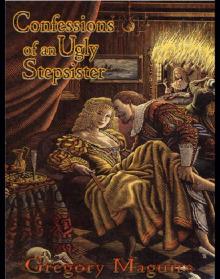 Confessions of an Ugly Stepsister
Confessions of an Ugly Stepsister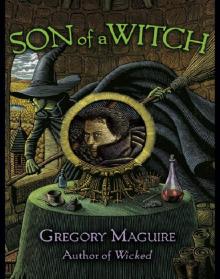 Son of a Witch
Son of a Witch Matchless
Matchless The Next Queen of Heaven
The Next Queen of Heaven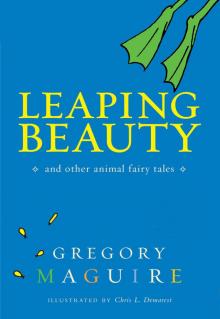 Leaping Beauty: And Other Animal Fairy Tales
Leaping Beauty: And Other Animal Fairy Tales Hiddensee: A Tale of the Once and Future Nutcracker
Hiddensee: A Tale of the Once and Future Nutcracker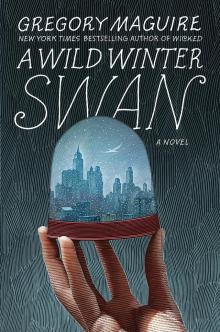 A Wild Winter Swan
A Wild Winter Swan Egg & Spoon
Egg & Spoon Out of Oz
Out of Oz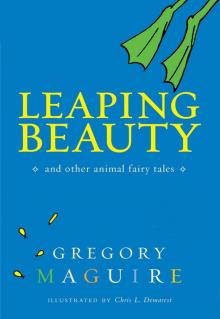 Leaping Beauty
Leaping Beauty Hiddensee
Hiddensee The Wicked Years Complete Collection
The Wicked Years Complete Collection The Next Queen of Heaven: A Novel
The Next Queen of Heaven: A Novel